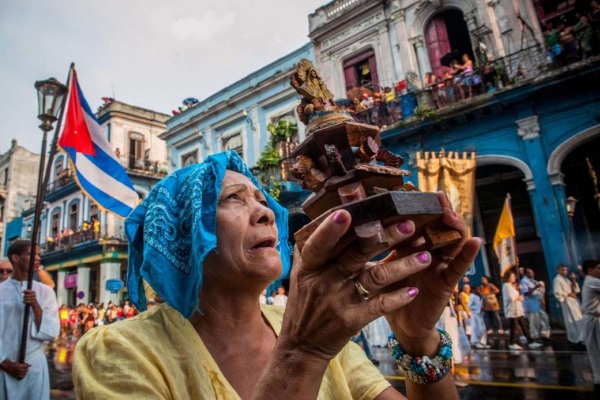
 Cubanet, Miriam Leiva, Havana, 6 January 2015 – The psychological barrier utilized by the Cuban government to keep its citizens subjugated was broken on the 17th of December. The surprising announcement that Raúl Castro would deliver a speech on US/Cuba relations, on live television, set off a tense anticipation of bad news. For 56 years, the US was the enemy aggressor, supposedly the cause of all problems in Cuba, and an excuse for repression.
Cubanet, Miriam Leiva, Havana, 6 January 2015 – The psychological barrier utilized by the Cuban government to keep its citizens subjugated was broken on the 17th of December. The surprising announcement that Raúl Castro would deliver a speech on US/Cuba relations, on live television, set off a tense anticipation of bad news. For 56 years, the US was the enemy aggressor, supposedly the cause of all problems in Cuba, and an excuse for repression.
The General/President went from the traditional reminder of the confrontation to a smile upon announcing the reestablishment of diplomatic relations with the US. Continuing the surprise was the immediate broadcast of statements by US President Barack Obama. The following day both announcements were published in the newspapers and the news has been highlighted in year-end reviews on television as the most important event of 2014.
Since then it has become the main topic of conversation. Most Cubans, according to their aspirations, knowledge and analytical ability, pin their hopes on the US. Among the more interesting opinions heard on the street, an average citizen – envisioning potential benefits to the people and the nation – could be heard remarking on how the boom in North American travelers would stimulate the economy.
His reasoning was that there is no extensive hotel and service infrastructure in the country. Therefore, as occurred during the 1990s, more rooms to rent in private homes will be needed, as will more private restaurants and cafeterias. Similarly, a greater supply of agricultural and artisanal products will be required. There will be an increased demand for service employees and for individuals skilled in the construction and repair trades.
In brief, the reestablishment of US/Cuba relations could be of great benefit for the impoverished population, the community, and Cuba as a whole. Tourism in 2014 reached 3 million visitors, according to Cuban media. Certainly the government continues the policy of tourism apartheid in Varadero and the Cuban Keys.
In any case, Cienfuegos and other prime tourism spots lack the infrastructure to absorb imminent, substantial increases in visitor traffic. The cruise ship companies tend to be concentrated primarily in Havana, for which the Avenida del Puerto is being upgraded, but it’s unlikely to see a big boom, given current conditions, and it won’t affect earnings from other forms of tourism. The affluence of North Americans, with their varied interests and greater buying power, will substantially increase demand.
Within this context, new possibilities of supplies and greater economic assistance from relatives, friends, and non-governmental organizations based in the US would create the financial conditions needed for private tourism-related enterprises to flourish, as had happened on a tiny scale over the last twenty years, but now with a much greater expansion. Farmers could receive equipment and advise, they would be more productive, improve their quality and their earnings. After paying back an initial investment, they would no longer depend on external help. The self-employed would need to need to increase their methods and output, and they would be more independent.
The current support of the family economy would nurture the creation of small and medium-sized enterprises (SMEs), in turn complementing the nation’s macroeconomy, as is the case the world over including in countries that are close to the Cuban government, such as Bolivia and Ecuador. One could also foresee the expansion of mini-enterprises, which in many places have provided opportunity to very poor people, primarily women who carry the full weight of their family, and allow them to access credit from outside the country to start their own businesses.
The Cuban government will need to expand its limits on substantial foreign investments for its own controlled projects, above all in tourism, and listen to the analysts and the multi-faceted cries from the people. The restrictions created to ensure that “nobody will become rich,” continue to drag down the quality of life for Cubans. Beyond that, it deepens poverty, corruption, and loss of values, evils engendered by the regime.
The opportunities that President Obama has opened could increase the Cuban people’s well-being and knowledge and contribute to their empowerment, as have measures adopted by the Island’s government since 2009. The Cuban government has the opportunity not to block their implementation for the benefit of the nation. All Cubans should be involved in the great challenges and opportunities that open before us.
Translated by Alicia Barraqué Ellison
